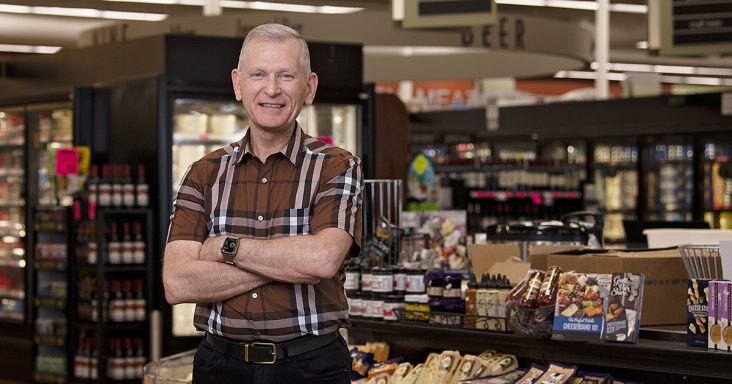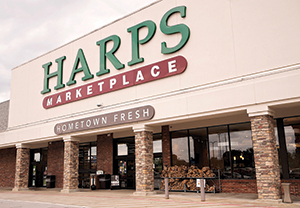Harps Food Stores has record revenue year amid COVID challenges
by July 28, 2021 1:09 pm 3,545 views

Kim Eskew, CEO of Harps Food Stores Inc.
Harps Food Stores Inc. has plenty to celebrate in its 91st year of business. The Springdale-based company has come a long way since founders Floy and Harvard Harp opened the Harps Cash Grocery in downtown Springdale with $500 in 1930. Today, Harps is one of nine regional grocers servicing the southern part of the U.S. The company is also one of the largest privately-owned businesses in Arkansas.
Harps met the COVID-19 challenge directly in 2020. Despite the uncertainty, the regional grocery chain posted its first $1 billion year, ending the fiscal year (ended Aug. 30) with $1.01 billion in revenue. Harps also opened 20 new stores while the pandemic shut down much of the nation.
CEO Kim Eskew said that as the country was idle in early March 2020, Harps had just acquired 20 stores from Town & Country Grocers in Fredericktown, Mo. That followed four other store acquisitions in February.
“While schools and many businesses closed and most people began to work from home, we had hundreds of people staying in hotel rooms trying to get these stores opened,” Eskew said. “The biggest concern I had was that we might have to shut down if too many of our people became ill with COVID-19.”
He said the corporate offices at Harps never closed, and home office employees reported to work throughout the pandemic.
“I didn’t think it would be right to ask our store employees to come to work serving customers and us not being willing to do the same,” Eskew said. “We followed [Centers for Disease Control and Prevention] protocol, which was constantly changing. And company-wide we had about 700 cases, none of which were contracted from the workplace.”
Harps employs roughly 5,500 people across 114 stores and its warehouse and corporate operations. Eskew said the most significant challenge he faces today is filling the 700 jobs he has open across the business. He said Harps paid employees a $1,500 bonus for their stellar effort to work throughout the pandemic. He said the company is not requiring employees to get the vaccine, but he hopes everyone will do so.
Eskew said Harps had a banner year despite the pandemic’s challenges, with sales rising 22.4% from 2019. During fiscal 2020 ended Aug. 30, sales eclipsed $1 billion, growing from $770 million in 2018 and $776 million in 2019. Eskew pegs sales in fiscal 2021 to be up another 20% as people continue to eat more meals at home.
He said the partnership with Instacart — announced in November 2018 — was a no-brainer and allowed Harps to compete in the online grocery craze amid the pandemic.
“I expected online sales to decline sharply once the vaccine came out,” Eskew added. “Sales have come down some, but they are still up about eight times those in 2019.”
With more consolidation expected in the traditional grocery sector, Eskew said Harps continues to look for expansion opportunities to grow its footprint within and out of its four-state area of Arkansas, Oklahoma, Missouri and Kansas.
“We have looked at stores in Tennessee, Mississippi and Kentucky, but there need to be at least five stores in a new area to make it feasible for us,” he said.
FORMAT CHANGES
Eskew said Harps has experimented with some different retail formats over the years while keeping grocery at the heart of the business. He said the company modeled its Price Cutter format after a warehouse, low-expense model. It emerged in the mid-1980s. He said that was a value format, and while the company opened about six of the stores, just one of them remains today in Van Buren.
The company also experimented with a Hispanic grocery store in Rogers in the early 2000s, which is now a 10Box format.
A few years ago, Harps introduced the 10Box Cost Plus format stores, which originated from the Associated Wholesale Grocers CashSaver model. That’s a best-deal store where items are typically commodity-grade and sold at a value. Eskew said the cost of goods is 10% over wholesale pricing, and the no-frills stores are performing well. There are nearly a dozen formats that tend to do well in areas where the demographics include larger family sizes. He said one of the bestselling items in the stores is whole rib-eye roasts, which Harps will cut into individual rib-eye steaks for the customers. He said it’s not “choice” grade, but “select” grade beef usually sold in 10Box formats.

Eskew said Harps also operates two Ace Hardware stores, the newest format for the grocery store chain. He said the company took over a store in Charleston (Franklin County). There was already a local grocery store but no hardware or home building store within 40 miles.
“We opened an Ace Hardware Store there, and it did well last year as people needed things for their home and didn’t want to drive 40 miles to a Home Depot or Lowe’s,” Eskew said. “We are planning to open the second one in Jay, Okla., in the coming days. There we will have a Harps Food Store on one side and the Ace Hardware on the other side with a wall between the two businesses,” he said.
Eskew also said Harps is considering the addition of a few self-checkout stations in some stores. He said they would never replace the cashiers who greet the customers and bag the groceries. But he does see the benefit of having a few stations to serve people who have just one or two items.
“Instead of waiting behind a customer with a full basket, they could slide over and use the self-checkout and be out the door quicker,” Eskew said. “That’s how I see self-checkout working for us at Harps.”
Online grocery is worrisome for Eskew because he said no one has figured out how to do it sustainably. He said it costs the company, and while some large retailers can cut expenses in other areas to pay for it, that’s not an option for Harps.
“We offer online grocery and delivery through Instacart, but we also think there are still enough people who still want to pick out their groceries and have someone else check them out. We will be there for them,” he said.
LEADERSHIP & OWNERSHIP
Eskew, 64, joined Harps while in college at the University of Arkansas. During four decades in the grocery business, he rose through the ranks from stocker, checker and sometimes bathroom cleaner into store management and district manager to become president in 2008. He was appointed CEO in 2016 when Roger Collins semi-retired and then took over as chairman in 2018. Today, Eskew said that even as CEO, Harps is still a 100% employee-owned company and he rarely makes any decisions by himself.
“I have a tremendous team around me, and it’s been important to me to be a leader where anyone and everyone can feel free to disagree,” he said. “We run a collaborative business, and it’s not uncommon for us to implement ideas we get from employees out in the field. I love the culture we have here, and it does feel like an extended family.”
Eskew said the employee ownership sets the company apart from most other grocery store chains. He said it could pay off long term for employees who make a career at Harps. Employees completed a leveraged buyout from the Harp family in 2001. Since then, the share price has risen from $27 a share to $445 a share in fiscal 2018. Last year, the price soared to $714 a share, and it’s poised to grow another 20% this coming year.
“In a down year, it grows 6%, and it averages 19% most years,” Eskew said. “This is a meaningful addition to someone’s retirement when they leave here. We can’t pay what the Fortune 100 or 500 companies do around here, but we offer company ownership and a chance for a real work-and-family-life balance. We are a big family, and that kind of culture has been perfect for me.”
He shirked the notion of retirement anytime soon because he loves coming to work.
“Every year I see people I have worked with for decades hang it up. I am just not sure when that will be for me,” he said.
